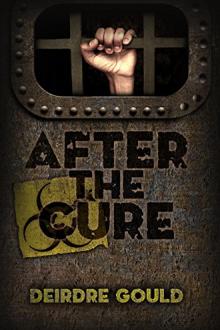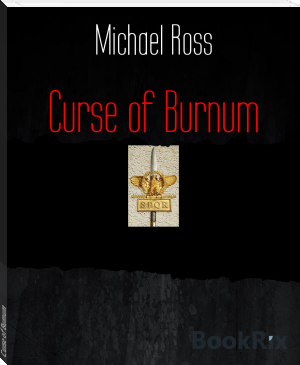After the Cure, Deirdre Gould [the beach read TXT] 📗

- Author: Deirdre Gould
- Performer: -
Book online «After the Cure, Deirdre Gould [the beach read TXT] 📗». Author Deirdre Gould
“I assume you've seen Sevita's footage of the first people who were rounded up and Cured- everybody has. It was awful, all those people waking up to the world around them, to what had happened to their families and their friends- to what they remembered doing themselves. Everyone remembers Isaac Green's suicide because his was the first one and it was broadcast on television with the first reports. What most people don't realize is that he was just the first of many. Hundreds Frank, hundreds every day. We took all the precautions that we could, administering the Cure in smaller batches so we could watch them, eliminating weapons in the Cure tents once the Infected were sedated, even keeping people in the camp longer than they really needed to be there so we could make sure they were stable. It didn't matter. They found ways or they waited weeks until they left the camp and then did it on the road. They used the camp bedsheets to hang themselves or broke into the medical waste bins and injected themselves with needles full of air. Some of them drank cleaning supplies. A few even waited for hours underneath military vehicles for the one soldier who wasn't paying attention to run them over. Every day, over and over and over. My overseer, Dr. Taylor, kept telling us that it wasn't our fault, that the normal human mind wasn't equipped to function correctly after trauma like these people had seen. But I started to think maybe we shouldn't Cure them. Maybe it was better if they just stayed Infected, because at least they weren't destroying themselves with grief then. I told Dr. Taylor we should consider lifelong institutionalization instead. He told me I was not being realistic, that there weren't enough healthy humans left to sustain our own survival, let alone police, care for and feed thousands of Infected.” Nella rubbed a few tears off her cheek with a rough hand and continued.
“But at last, Dr. Taylor couldn't take any more either. We had just administered the Cure to a new batch of people and they were sleeping off the sedative while the antibiotic did its job. I woke up and it was still dark, but someone was shooting a gun. The soldiers had orders to only dart any Infected that got too close to the camp, so that they would get the Cure. It was a big switch for many of them, they were used to thinking of the Infected as something to be eliminated, not as human beings with minds that could recover and lives that could be useful and normal. Sometimes a soldier disobeyed, but he was usually stopped by a superior before he could actually kill anyone. Not this time though.
“I got out of bed, confused, because the sound was coming from the patient tent, not the perimeter. Which was probably why no soldiers stopped him. I ran to the tent and before I even lifted the flap I could smell the gunpowder hanging in the air. And I knew they must all be dead. I lifted the flap and there was Dr. Taylor, moving from bed to bed on the last row of over one hundred people. He aimed his gun at the sleeping patient's head and pulled the trigger. I yelled for him to stop, and I ran toward him, pushing carts and beds out of the way. I tripped once and heard the gun go off again. He only stopped to reload and that's when I reached him and tried to grab the gun. He just coolly pointed it at me instead. 'Nella,' he said, 'you're a good person and a damn fine doctor in a world that desperately needs you. I don't want to kill you, but I will if you stop me.'
“He said it as if he were listing the symptoms of a disease to a group of interns. As if it were something he had said every day of his life. 'Why are you doing this?' I asked him. Dr. Taylor turned and shot the next patient before he answered me. 'We can't institutionalize them. We can't let them roam around the way they are and expect any sort of security in our lives.' He shot another. There was only one left and by this time I was sobbing, but he kept pointing the gun back toward me between patients, so I wouldn't come closer. 'The Cure makes them remember everything and I can't keep them from killing themselves. The last one couldn't be bothered to find anything to do it properly. So he sat in the sun in front of my tent for three days and refused water and food. He tore out every intravenous line we put in. He just died. I'm tired Nella. The only people that seem to survive are the people that would have been murderous pricks without the Infection.' Dr. Taylor shot the last patient, a child. He turned back. 'I might as well do the good ones a favor and put them out of their misery. And the world a favor by eliminating the ones that would just be criminal anyway.'
'That's not true!' I kept saying, but he wasn't listening. He cleared his throat and raised the gun to his own head. He shrugged.
'Don't feel bad Nella. I would have been a murderous prick either way.' And he shot himself.”
Frank swore under his breath. “It wasn't your fault,” he said.
Nella shook her head and wiped her face with her hands. “No,” she said, “it wasn't. But it stayed with me. It crept up on me every time I was talking with a survivor or waiting for a Cure to work or receiving news about another suicide. We routinely interviewed our patients every day from the time they woke up to the time they left the camp. But it was very disorganized, especially after Dr. Taylor died. So you could be assigned five or ten patients one day and see a completely new set the other day, depending on who had left the camp or died the night before. One morning, I was making my rounds and I met someone that I recognized. It was nothing I expected, we were miles from anywhere I'd lived or worked. We were overworked and exhausted. I'd been with the medical team for almost two years at that point and we didn't have breaks or days off or even full night's rests most of the time. I must have helped to treat thousands of people by then and after a while, their faces and their stories just seemed to blur together. Like one long streak of bad luck wrapped around each day. I stopped looking at faces. I stopped listening to stories. Because they were all the same. I just started reading charts and the notes the other doctors left instead. That day, I had been specifically assigned to one particular case because I seemed to do better with people that weren't responding to the Cure the way they ought to.
“Sometimes, they had just been infected for so long that their brains had suffered permanent damage from the swelling. I think that's what happened to Ann. We didn't see too many, because most Infected killed each other, suffered accidental deaths or succumbed to secondary infections and starvation. But there were a few that survived that long. Most of these were kept at the camp until a family member could come and care for them or until the military developed an institution for their care.
Sometimes, they had a bad reaction to the antibiotic. Those were the easiest to treat. It was the same as other allergic reactions and we knew how to deal with it.
This particular case though, fell into the unknown pile. And that's why I was assigned. I had worked in a hospital during school as part of my training. Most of the time I saw a patient for a day, maybe two before they were released. A few though, barely made it out for a week before returning. One of them, a man named Martin, had a severe case of paranoid schizophrenia. He couldn't afford his medication, so every week the local beat cop would write him up on a minor infraction so that he could bring Martin in to the hospital for treatment. We'd give him his medication along with the few days' supply that we could get away with and then release him again for another week. It wasn't ideal and the entire staff knew it wasn't going to work forever, because he was getting worse even when we managed to keep him medicated. One day, maybe only a month or two before the Plague was at its worst, something finally snapped for good inside Martin. He found a crow bar somewhere and beat the cop that came to pick him up with it. The officer was so badly beaten that he was in intensive care- I guess until he was infected or died, I'm not sure. But Martin was taken to a permanent facility immediately. Everything happened so fast after that, I had never really considered what happened to him or to the officer. I'm still not entirely sure whether Martin escaped the facility somehow or whether an orderly decided to let the inmates out when things got bad.
However it happened, Martin was free, and he was Infected. He must have wandered for miles during the year and a half until he was Cured. I didn't realize it was him until I got to the side of his cot. He was sleeping when I got there. He was so filthy I didn't recognize him for a while. That's how the other doctors knew something was off. The first thing that most of the Cured wanted to do, once the initial shock wore off, was scrub themselves clean. In fact, we had to have nurses watch many of them so that they didn't physically rub their skin off or damage their teeth in order to believe themselves completely clean. I'm sure you understand what that urge was like.”
Frank nodded. “The first thing I did was brush my teeth. Someone stopped me after a tube of toothpaste and twenty minutes were gone. But I could still- I could still taste them on my tongue. I would have kept going if I could.”
“But this guy, he didn't care. He didn't want to shower or brush his teeth or have his haircut- nothing. He had blood and matter clotting in his beard and around his lips, he had sores from bites that were festering and stank like rotting meat. His nails were long and sharp, like brown, brittle claws and he didn't care. And when the nurses tried to wash him anyway, thinking maybe he was catatonic with shock, he attacked them, accusing them of trying to kill him. He was so vicious with his teeth smashing together and his long, sharp nails raking everything he could reach, that they thought the Cure had failed. The only way they were able to be certain that it hadn't was that they heard him speak.
When he did speak though, he





Comments (0)